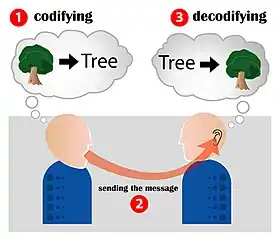Communication design
Communication design is a mixed discipline between design and information-development which is concerned with how media intervention such as printed, crafted, electronic media or presentations communicate with people. A communication design approach is not only concerned with developing the message aside from the aesthetics in media, but also with creating new media channels to ensure the message reaches the target audience. Some designers use graphic design and communication design interchangeably due to overlapping skills.
Communication design can also refer to a systems-based approach, in which the totality of media and messages within a culture or organization are designed as a single integrated process rather than a series of discrete efforts. This is done through communication channels that aim to inform and attract the attention of the people one are focusing one's skills on. Design skills must be tailored to fit to different cultures of people, while maintaining pleasurable visual design. These are all important pieces of information to add to a media communications kit to get the best results.[1]
Within the discipline of Communication, a framework for Communication as Design has emerged that focuses on redesigning interactivity and shaping communication affordances.[2] Software and applications create opportunities for and place constraints on communication. Recently, Guth and Brabham examined the way that ideas compete within a crowdsourcing platform, providing a model about the relationships among design ideas, communication, and platform.[3] The same authors have interviewed technology company founders about the democratic ideals they build into the design of e-government applications and technologies.[4] Interest in the Communication as Design framework is growing among researchers.
Overview
Communication design seeks to attract, inspire, create desires and motivate people to respond to messages, with a view to making a favorable impact. This impact can be to the bottom line of the commissioning body, which can be either to build a brand or move sales. It can also range from changing behaviours, to promoting a message, to disseminating information. The process of communication design involves strategic business thinking, using market research, creativity, problem-solving, and technical skills and knowledge such as colour theory, page layout, typography and creating visual hierarchies. Communications designers translate ideas and information through a variety of media. Their particular talents lie not only in the traditional skills of the hand, but also in their ability to think strategically in design and marketing terms, in order to establish credibility and influence audiences through the communication.
The term communication design is often used interchangeably with visual communication, but has an alternative broader meaning that includes auditory, vocal, touch and smell. Examples of communication design include information architecture, editing, typography, illustration, web design, animation, advertising, ambient media, visual identity design, performing arts, copywriting and professional writing skills applied in the creative industries.
Education
Students of communication design learn how to create visual messages and broadcast them to the world in new and meaningful ways. In the complex digital environment around us, communication design has become a powerful means of reaching out to the target audience. Students learn how to combine communication with art and technology.[5] Communication Design discipline involves teaching how to design web pages, video games, animation, motion graphics and more.
Communication Design has content as its main purpose. It must achieve a reaction, or get customer to see a product in a genuine way to attract sales or get a message across. Students of Communications Design are often Illustrators, Graphic Designers, Web designers, Advertising artists, Animators, Video Editors, Motion graphic artists, or even Printmakers and Conceptual Artists. The term Communications Design is fairly general and practitioners work in various mediums to get a message across.
Subdisciplines
- Advertising
- Art direction
- Brand management
- Content strategy
- Copywriting
- Creative direction
- Graphic design
- Illustration
- Industrial design
- Information architecture
- Information graphics
- Instructional design
- Marketing communications
- Performing arts
- Presentation
- Technical writing
- Visual arts
Visual communication design
Visual communication design is the design working in any media or support of visual communication.[6][7][8] This is considered by some to be more correct terminology to cover all types of design applied in communication that uses visual channel for transmission of messages,[9][10][11] precisely because this term relates to the concept of visual language of some media and not limited to support a particular form of content, as do the terms graphic design (graphics)[12] or interface design (electronic media).
Footnotes
- "Archived copy" (PDF). Archived from the original (PDF) on 2015-04-13. Retrieved 2014-10-30.CS1 maint: archived copy as title (link)
- Aakhus, Mark (2007-03-01). "Communication as Design". Communication Monographs. 74 (1): 112–117. doi:10.1080/03637750701196383. ISSN 0363-7751. S2CID 143543646.
- Guth, Kristen L.; Brabham, Daren C. (2017-08-04). "Finding the diamond in the rough: Exploring communication and platform in crowdsourcing performance". Communication Monographs. 0 (4): 510–533. doi:10.1080/03637751.2017.1359748. ISSN 0363-7751. S2CID 54045924.
- Brabham, Daren C.; Guth, Kristen L. (2017-08-01). "The Deliberative Politics of the Consultative Layer: Participation Hopes and Communication as Design Values of Civic Tech Founders". Journal of Communication. 67 (4): 445–475. doi:10.1111/jcom.12316. ISSN 1460-2466.
- "Visual Communication Design". Department of Art, Art History & Design. University of Notre Dame. Retrieved 4 April 2019.
- MUNARI, Bruno. Design and visual communication. Chronicle Books, 2006
- WOLLNER, Alexandre. Visual Design 50 years. Cosac & Naify, 2003
- LANGENFELDS, Ranya. Visual design. TEAME, 1997
- LEEUWEN, Theo Van. Reading images: the grammar of visual design. Routledge, 2006 - Pg. 4
- FRASCARA, Jorge. Communication design: principles, methods, and practice. Allworth Communications, Inc., 2004 - Pg. 4
- GARRET, Lillian. Visual design: a problem-solving approach. Michigan: R. E. Krieger Pub. Co., 1975.
- MEGGS, Philip B. A history of graphic design. Michigan, Van Nostrand Reinhold, 1992 - Pg.xiii Preface

